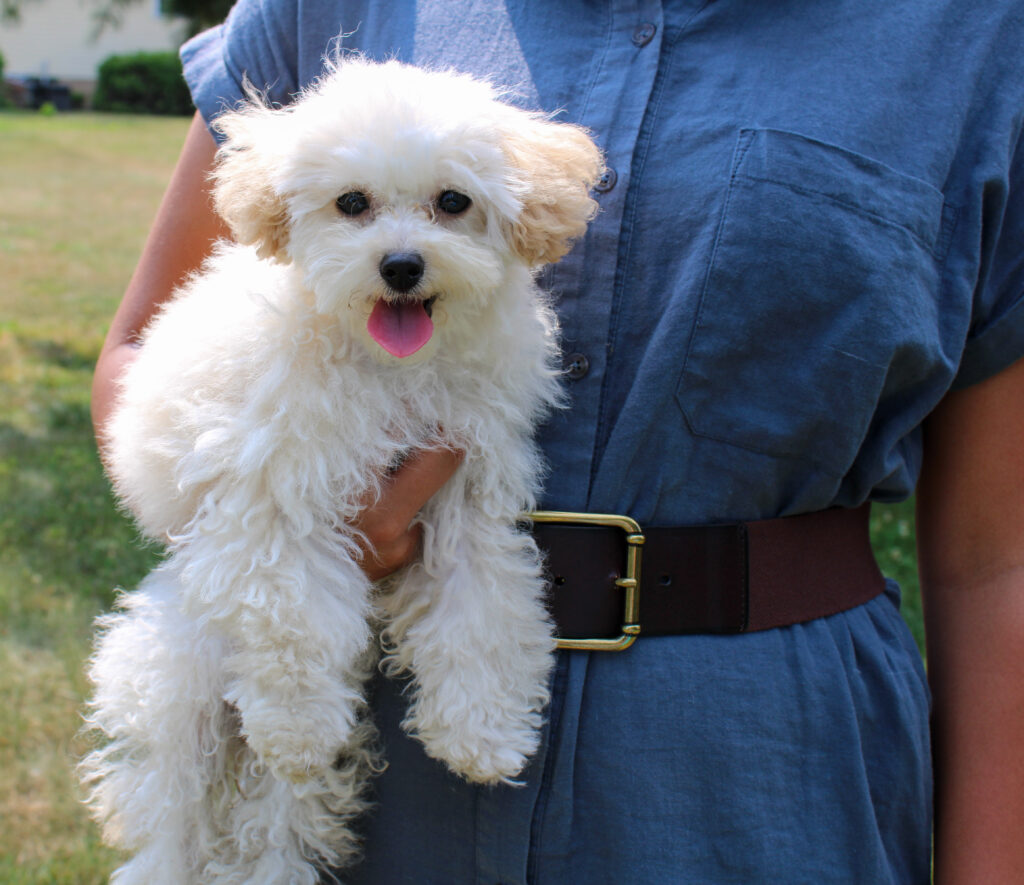Meet Our Available Puppies
Find the perfect ‘tail’ for your story!
The Puppy You've
Been Waiting For.
Product Title Here
Put a bird on it tumblr trust fund sustainable williamsburg green juice.
Product Title Here
Put a bird on it tumblr trust fund sustainable williamsburg green juice.
Product Title Here
Put a bird on it tumblr trust fund sustainable williamsburg green juice.
Product Title Here
Put a bird on it tumblr trust fund sustainable williamsburg green juice.
Product Title Here
Put a bird on it tumblr trust fund sustainable williamsburg green juice.
Product Title Here
Put a bird on it tumblr trust fund sustainable williamsburg green juice.
March 19, 2025

The other day, I was chatting with a friend who’s been thinking about getting a new dog. She wanted a small, affectionate companion but wasn’t sure which breed would be easier to train. “I’m torn between a Maltipoo and a Lhasa Apso,” she said. “I just want a dog that listens!” so Maltipoo vs Lhasa Apso, which one is better for me?
I couldn’t help but laugh. Training can make or break your experience as a dog owner, and while both breeds are adorable and loving, they have very different attitudes when it comes to training.
So, let’s break it down: Maltipoo vs Lhasa Apso—Which one is easier to train, and which is a better fit for your home?

Maltipoo vs Lhasa Apso: What’s the Difference?
At first glance, Maltipoos and Lhasa Apsos have a lot in common. They’re small, affectionate, and full of personality, but their backgrounds and temperaments set them apart.
| Trait | Maltipoo | Lhasa Apso |
|---|---|---|
| Parent Breeds | Maltese x Mini/Toy Poodle | Purebred Lhasa Apso |
| Size | 3-20 lbs | 12-18 lbs |
| Coat | Wavy or curly, soft | Long, straight, dense |
| Shedding | Very low to none | Moderate |
| Trainability | Highly trainable, eager to please | Independent, can be stubborn |
| Energy Level | Moderate | Low to moderate |
| Temperament | Affectionate, playful, social | Loyal, confident, independent |
| Best For | Families, therapy work, emotional support | People who want a dignified, low-energy companion |
Right away, you can see that Maltipoos are more eager to please, while Lhasa Apsos tend to have a mind of their own.

Maltipoo vs Lhasa Apso: Which Breed is Easier to Train?
🐶 Maltipoos: The Quick Learners
Maltipoos are highly intelligent and eager to please, thanks to their Poodle parentage. Poodles are among the smartest dog breeds in the world, and Maltipoos inherit that sharp learning ability.
✔️ Highly trainable – They pick up commands quickly.
✔️ Eager to please – They love positive reinforcement.
✔️ Food-motivated – Training is easier with treats and praise.
What to Expect When Training a Maltipoo
Maltipoos are people-oriented dogs, meaning they thrive on interaction. They respond well to praise, treats, and play-based training. Short, fun training sessions work best, as they can get bored if things become repetitive.
🚀 Pro Tip: Start training early! Maltipoos are incredibly smart, but like any puppy, they need structure from the start. Crate training, potty training, and basic obedience should begin the day you bring your puppy home.
🐾 Fun Fact: Maltipoos are often chosen for therapy work and emotional support roles because they are so attuned to human emotions and easy to train.
🐾 Lhasa Apsos: The Independent Thinkers
Lhasa Apsos have a very different personality. These dogs were originally bred to guard Tibetan monasteries, which means they have a natural independence and a strong sense of loyalty. While they’re devoted to their owners, they’re not always eager to take commands.
✔️ Loyal and protective – They bond deeply with their family.
✔️ Smart, but strong-willed – They understand commands but may choose to ignore them.
✔️ Better for experienced dog owners – They require patience and consistency in training.
What to Expect When Training a Lhasa Apso
Lhasa Apsos aren’t difficult to train because they lack intelligence—on the contrary, they’re very smart. The challenge is that they have a mind of their own. They may listen when it suits them rather than when you ask.
Training a Lhasa Apso requires:
- Patience – They aren’t always eager to follow instructions.
- Firm but positive reinforcement – Harsh training won’t work; they need respect-based training.
- Consistent routines – They do best when they know what to expect.
🚀 Pro Tip: If you own a Lhasa Apso, start training early and be consistent. They respond best when training is firm, structured, and paired with rewards.
🐾 Fun Fact: Lhasa Apsos were considered sacred protectors in Tibetan culture, and they still have a strong sense of independence and watchfulness today.

Maltipoo vs Lhasa Apso: Which Breed is Better for Autism Support?
If you’re looking for a therapy or emotional support dog, both breeds have their advantages, but they offer different types of support.
Maltipoos & Autism: The Loving Companion
Maltipoos are naturally in tune with human emotions. Their gentle, affectionate nature makes them an ideal emotional support dog.
✔️ Great at deep pressure therapy – They love to cuddle and provide comfort.
✔️ Adaptable and social – They’re happy in different environments.
✔️ Easy to train for therapy work – Their intelligence and eagerness to please make them great candidates.
Lhasa Apsos & Autism: The Steady Guardian
Lhasa Apsos are less socially demanding, which can be beneficial for individuals who prefer a quieter, less interactive companion.
✔️ Loyal but independent – They’re affectionate without being clingy.
✔️ Consistent presence – Their steady temperament provides comfort.
✔️ Protective and watchful – They can help create a sense of security.
**If you’re looking for an interactive, easily trainable therapy dog, a Maltipoo is the better fit. If you prefer a quiet, low-energy dog who provides steady companionship, a Lhasa Apso might be the right choice.

Finding an Ethical Maltipoo Breeder
If you’re leaning toward a Maltipoo, finding an ethical breeder is essential.
At Storytail Dogs, we focus on:
🐶 Matching puppies to families based on temperament.
🏡 Early socialization – Our puppies grow up in a home environment, not kennels.
🐾 Confidence-building from day one – We expose puppies to children, household noises, and different experiences.
🩺 Genetic health testing & ethical breeding – We prioritize healthy, well-adjusted puppies.
Want to see our available Maltipoo puppies? Check out our Available Puppies page!
Final Thoughts: Maltipoo vs Lhasa Apso – Which One is Right for You?
Choose a Maltipoo if you want:
✔️ A highly trainable, eager-to-please dog.
✔️ A social, affectionate companion that loves people.
✔️ A dog that’s great for therapy or emotional support work.
Choose a Lhasa Apso if you want:
✔️ A loyal, independent dog that isn’t too needy.
✔️ A low-energy, low-maintenance breed.
✔️ A dog that’s watchful, steady, and dignified.
Want to Learn More About Maltipoos and Lhasa Apsos?
If you’re still deciding between a Maltipoo and a Lhasa Apso, learning about each breed’s history, temperament, and training needs can help. The American Kennel Club (AKC) provides a detailed breakdown of the Poodle’s intelligence and trainability, which makes Maltipoos so eager to learn. For insight into the Lhasa Apso’s independent and dignified nature, check out the AKC’s Lhasa Apso page.
If you’re considering a therapy or emotional support dog, Therapy Dogs International explains how dogs are trained and certified for therapy work. Since Maltipoos are often chosen as therapy dogs, learning about the process can help determine if one might be the right fit for you.
For more details about training techniques that work well with intelligent but independent breeds like the Lhasa Apso, visit The Association of Professional Dog Trainers (APDT). Their resources cover positive reinforcement techniques that make training more effective for all breeds.
💡 Still deciding? Let’s chat in the comments—I’d love to hear which breed sounds like a better fit for your home! 🐶✨
Leave a Reply Cancel reply
Storytail Dogs
A Dog For Your Story. Focused on READ dogs, therapy dogs, and resilient family companions.
@storytaildogs
© StorytailDogs 2024. All rights reserved. | Legal |